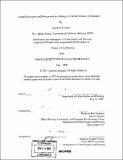Coastal restoration and management as a strategy for wealth creation in Louisiana
Author(s)
Sridaran, Lakshmi
DownloadFull printable version (38.44Mb)
Other Contributors
Massachusetts Institute of Technology. Dept. of Urban Studies and Planning.
Advisor
Karl Seidman.
Terms of use
Metadata
Show full item recordAbstract
With more people in the world living along coasts than any other environment, planning for the coastal zone requires negotiating the socially constructed human relationships that have traditionally produced severe inequality between coastal residents and users. In Louisiana, this inequality is apparent in the great deal of wealth external users have extracted from the coast at the direct environmental and economic expense of local residents. An examination of the economic history of Louisiana's coast reveals how this disparity between coastal residents and users has produced deleterious environmental consequences, which have grown exponentially precisely because this inequality between human residents and users persists today. The current coastal restoration and management strategy in Louisiana does not focus on the socially constructed origins of this continuing environmental destruction, but it must do so in order to restore any hope of saving, restoring, and improving the coast. This thesis offers a socially reconstructed strategy for coastal restoration and management in Louisiana that narrows the environmental and economic disparity between coastal users and residents to address the environmental harm. This new wealth creation strategy enables local firms and residents to offer their existing knowledge of the coast and participate in the implementation of restoring and improving the natural assets of their coast through a variety of economic incentives. (cont.) In this way coastal residents are empowered to gain both the economic and environmental benefits of managing their coast, which I define as wealth. A case study of the Pulicat coastal community in Tamil Nadu, India provides valuable insights on how such a strategy can be implemented utilizing the existing civic and institutional infrastructure in Louisiana. The three significant recommendations this thesis offers can be implemented immediately to begin socially reconstructing Louisiana's coastal restoration and management strategy. The urgency and magnitude of environmental destruction to Louisiana's coast mandates such a bold shift.
Description
Thesis (M.C.P.)--Massachusetts Institute of Technology, Dept. of Urban Studies and Planning, 2009. Includes bibliographical references (p. 131-133).
Date issued
2009Department
Massachusetts Institute of Technology. Department of Urban Studies and PlanningPublisher
Massachusetts Institute of Technology
Keywords
Urban Studies and Planning.